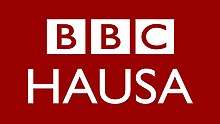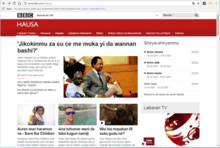BBC Hausa
BBC Hausa is the Hausa language service of BBC World Service meant primarily for the Hausa-speaking world in Nigeria, Ghana, Niger and the rest of Hausa speakers in West Africa. It is part of BBC foreign language output of 33 languages, of which five are African languages. The language service include radio station, Abuja bureau office and daily updated website which serves as a news portal and provides information as well as analyses in text, audio and video and provides online access to radio broadcasts. The radio service is broadcast from Broadcasting House in London and preliminary editing done at BBC bureau office in Abuja.[1]
 | |
| Type | Radio network and website |
|---|---|
| Country | |
| Availability | International |
| Owner | BBC |
Launch date | 13 March 1957 |
Official website | www |
| Language | Hausa |
History
BBC Hausa service was the first African language service begun by BBC and is one of the five African languages it broadcasts. The service was launched on 13 March 1957, at 0930 GMT with a 15-minute programme under BBC World Service presented by Aminu Abdullahi Malumfashi. Later, a translated version was read by Abubakar Tunau in the programme West Africa in the News.[2][3] The programmae was then aired on Wednesdays and Fridays only. Daily programme started one year later on 1 June 1958 and continuously run since then.[3]
In March 2017, the BBC celebrated its Hausa service 60th Anniversary in Abuja. The director of the BBC World Service Group, Fran Unsworth attended. She said in part:
"We are very proud of the BBC Hausa service and the many years of vital broadcasting it has provided for our audience. This fantastic milestone shows its great success, and long may it continue".[2]
Nigerian President, Muhammadu Buhari also sent a voice message at the occasion where he made known that he is BBC Hausa loyal listener and has spent many years listening its programmes.[2]
In its early days BBC rose to prominence in Hausa speaking world due to style of its reporting. It has conducted interviews with many prominent African politicians.
Abuja office
BBC Abuja office was opened in 2002.[3]
Broadcasting
At many times BBC Hausa service have senior editor, producers, assistant editor and senior reporter. There are also stringers in key Nigerian cities such as Kaduna, Kano, Jos, Enugu, Abuja and Sokoto as well as stringers in Niger republic, Ghana and the People's Republic of China.[4]
Broadcast by FM Radio stations in Nigeria
Many BBC Programme are rebroadcast by Nigerian media houses both radio and television through special partnership with the BBC World Service, these include the following media house:[5]
- Yola, Adamawa State –Radio Gotel - 917 kHz AM
- Maiduguri, Borno State –BRTV - 94.5FM
- Kano, Kano State –Freedom Radio - 99.5FM
- Dutse, Jigawa State –Freedom Radio - 99.5FM
- Kaduna, Kaduna State –Freedom Radio - 99.5FM
- Jos, Plateau State –PRTV - 88.65 FM, 92.1 FM, 90.5 FM, and 1313 kHz AM
- Sokoto, Sokoto State –Rima Radio - 97.1FM, 540 kHz AM
Online presence

With the advent of digital means of communication, listening to traditional radio set have been steadily declining sice 1990s.[6] BBC Hausa radio reaches around 17.7 million people every week and the website bbchausa.com is among the most visited websites in Nigeria.[7]
Perception of the service
A 2010 research report by the BBC Trust found that there is "a wide distrust of local media in the Hausa speaking regions of Africa where locals perceive local broadcasters and journalists as open to manipulation."[8]
See also
- BBC Urdu
- BBC Persian
- BBC Bangla
- BBC Somali
References
- "Game da mu". bbc.com/hausa. BBC. Retrieved 4 October 2017.
- "BBC Hausa marks 60th anniversary with lectures". dailytrust.com.ng. Daily Trust. Archived from the original on 11 October 2017. Retrieved 11 October 2017.
- "Sashen Hausa na BBC ya cika shekara 60". bbc.com/hausa. BBC. Retrieved 11 October 2017.
- "Ma'aikatan Sashen Hausa". bbc.com/hausa/staff. BBC Hausa. Retrieved 11 October 2017.
- "Abokan huldar BBC Hausa". bbc.com/hausa (in Hausa). BBC. Retrieved 11 October 2017.
- "Radio's Popularity Declining Unevenly". nytimes.com. The New York Times. Retrieved 11 October 2017.
- "BBC's Hausa service has started to host advertising". thenigerianvoice.com. The Nigerian Voice. Retrieved 11 October 2017.
- "Qualitative research on the BBC Hausa Service" (PDF). bbc.co.uk. BBC Trust. Retrieved 4 October 2017.